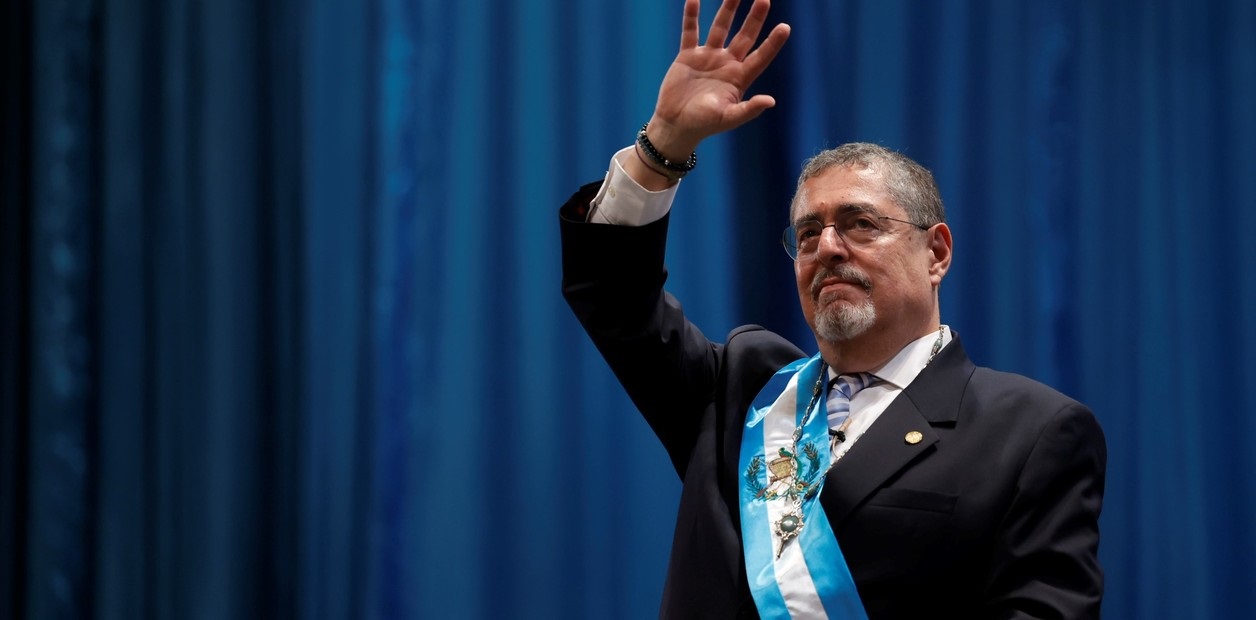
Published 01/15/2024 11:18 | Edited 01/16/2024 09:33
The new president of Guatemala, Bernardo Arévalo de León, finally took office, in the early hours of this Monday (15), after a day of tensions, and several months of uncertainty regarding democratic rupture.
Sociologist and former diplomat Arévalo, 65, leader of the left-wing Semilla Movement, was elected in August, when he obtained 58% of the valid votes compared to 37.2% for Sandra Torres, from the Unidad Nacional de la Esperanza (UNE), but went on to denounce the attempted coup led by the country’s Public Ministry, which during the months after the election imposed a judicial offensive on the elected candidate.
“Deputies have the responsibility to respect the popular will expressed at the polls. They are trying to violate democracy with illegalities, trivialities and abuses of power”, wrote Arévalo on social media, before the inauguration was confirmed.
For months, the Guatemalan Public Ministry attempted to strip him of his immunity as president-elect, dismantle his party and annul the elections, alleging electoral irregularities.
The attack was condemned by the UN, OAS, European Union and the United States, which sanctioned hundreds of prosecutors, judges and deputies for “corruption” and “undermining democracy”.
Brazil’s vice president, Geraldo Alckmin, signed a joint statement in support of the president-elect’s inauguration. The document, released this Sunday (14 January 2024), was distributed by the secretary general of the OAS (Organization of American States), Luis Almagro.
Brazil was represented by the vice-president and diplomat Benoni Belli, chosen by the Lula government to represent the country at the OAS (Organization of American States).
In addition to Alckmin, other heads of state participated in the inauguration ceremony, which was nine hours late, due to political disputes in the Guatemalan Congress triggered by the attempt to suppress Arévalo’s party.
Among the participants and guests, the president of Chile, Gabriel Boric, and Colombia, Gustavo Petro, were present. The head of European Union diplomacy, Spaniard Josep Borrel, also attended the ceremony.
The King of Spain, Felipe VI, left Guatemala amid delays and uncertainty about his inauguration and returned to Europe without seeing Arévalo with the presidential sash.
Tensions at the inauguration ceremony
The inauguration ceremony was scheduled for this Sunday afternoon (14), but was delayed by more than nine hours. The formalization of Bernardo Arévalo’s electoral victory came into doubt, after the Congress, mostly right-wing, was unable to reach an agreement on the new board of directors.
The confusion arose due to the discussion about whether to declare the deputies of Arévalo’s party, the Movimiento Semilla (Seed Movement, in the literal translation), as “independent”, due to a court order suspending this political movement for alleged irregularities.
The legislative maneuver was carried out by the Vamos party, a conservative party linked to former president Alejandro Giammattei, Arévalo’s predecessor.
The request was based on the opinion of prosecutors Rafael Curruchiche and Leonor Morales, supported by the president of the Public Ministry, prosecutor Consuelo Porras, alleging “anomalies” in the numbers presented in the electoral records and in the registration forms of Arévalo party activists.
However, the attempt ended up being disarmed in the late hours of Sunday, thanks to a decree from the Supreme Court of Justice of Guatemala, which forced the Legislature to take office of the new authorities since the opinion used to delay the inauguration had not been appreciated by the Judicial Power, therefore, had no legal validity.
Arévalo stated that in the coming days he will ask for the resignation of Attorney General Consuelo Porras, who led the judicial offensive against him and is sanctioned by Washington for “corruption” and “undermining democracy”.
Following the Latin American tradition of disrupting the balance between powers, the Public Ministry of the Central American country sought to destabilize Arévalo’s candidacy and inauguration by removing the immunity of the elected president, dissolving his party and annulling the election, arguing that there was “ electoral anomalies.”
The delay in the inauguration generated discontent among Arévalo’s followers, including many indigenous people, who, amidst jostling with the police, made their way towards the Parliament headquarters.
Source: vermelho.org.br

